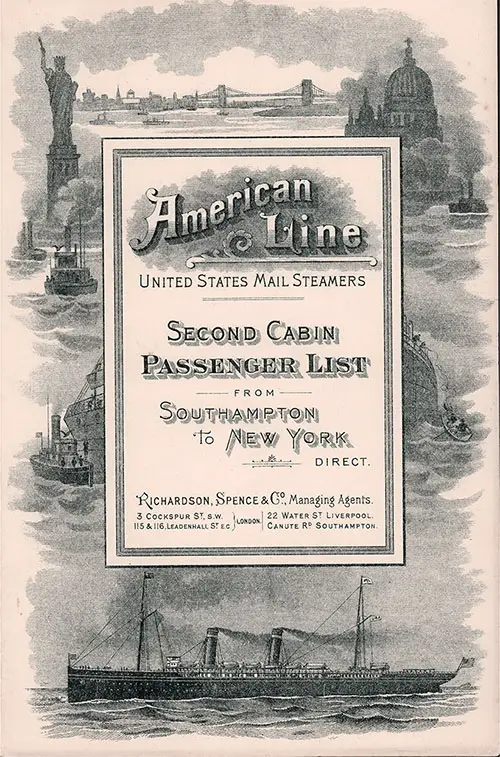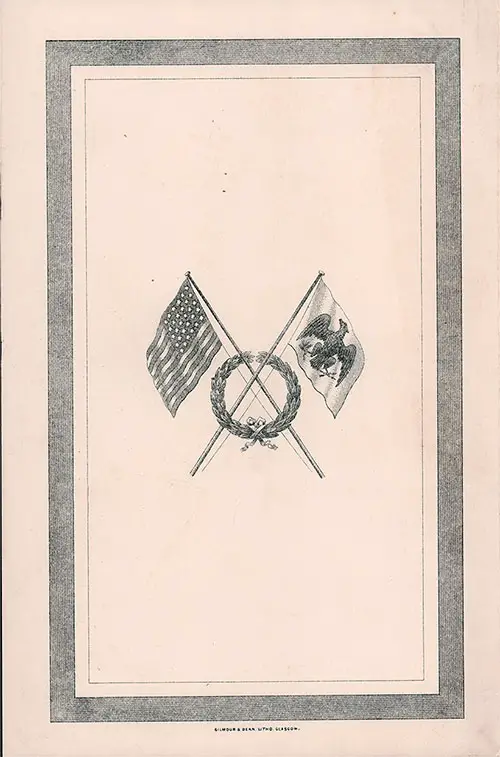SS New York Second Cabin Passenger List – Southampton to New York – 9 November 1896

Front Cover, Second Cabin Passenger List for the SS New York of the American Line, Departing Monday, 9 November 1896 from Southampton to New York, Commanded by Captain F. M. Passow. Superb Graphics Adorn the Covers of This Passenger List. a Collage of Steamships and Ocean Travel Scenes, With the Center Text Typography Using Bevel and Emboss Techniques for Added Elegance. A Collage of Steamships and Ocean Travel Scenes, With Bevel-And-Emboss Typography in the Title Block, Exuding the Prestige of the American Line. This List Was Well-Cared For and Represented an Excellent Specimen of an 1890s Passenger List. | GGA Image ID # 158c3f41db.
🚢 Review & Summary — SS New York Passenger List, 9 November 1896
Ship & Voyage Overview
The SS New York—one of the most celebrated liners of the American Line—departed Southampton, England, on Monday, 9 November 1896, bound for New York City under the command of Captain F. M. Passow. Built in 1888 by J. & G. Thomson of Glasgow, she was initially one of the fastest Atlantic liners, celebrated for both her speed and elegant accommodations. Known for her sleek twin funnels and stylish interiors, the New York routinely carried a mix of well-to-do travelers, emigrants, and commercial passengers between England and the United States.
This particular list records Second Cabin passengers, a class positioned between the luxury of Saloon accommodations and the modest Third Class steerage. Second Cabin travel often appealed to academics, skilled professionals, prosperous tradesmen, and upper middle–class families, offering comfort without the extravagant cost of first class.
The SS New York in Context
Launched: 1888
Builder: J. & G. Thomson, Glasgow
Operator: American Line (International Navigation Company)
Route: Southampton – Cherbourg – New York
Notable Facts: The SS New York was known for her speed, briefly holding the Blue Riband. She was a popular choice for American and British travelers alike and played a role in naval reserve duties during wartime.
Second Cabin Passengers
- Mrs. Emily Agosti
- Mr. W. H. Abbott
- Miss Lillie Bragg
- Mrs. Bancroft
- Master Harold Bancroft
- Miss F. A. Blanchard
- Mr. Ballantyne
- Mr. Arthur Cadge
- Mr. J. A. Cook
- Mr. Jas. Carr
- Mr. H. P. Cogswell
- Mr. Arthur Cramer
- Mr. Robert Flint
- Mr. Albert F. Fox
- Mr. Gus. A. Forbes
- Mrs. J. Goodhart
- Miss Louisa Gallusser
- Mr. Nicholas Gerasy
- Mr. Carlo T. Giorgi
- Mr. Miles W. Gibbons
- Mr. A. H. Green
- Mrs. Green
- Mr. Edward Hicks
- Mrs. Hicks
- Mr. Asa Hatfield
- Miss Lavinia Harvey
- Mr. Jos. Hulson
- Mr. D. A. Davidson
- Mr. Wm. Isern
- Miss Dyball
- Mrs. Isern
- Mr. Hans Johnsen
- Miss Alma Klintberg
- Mr. F. H. Lee
- Miss Kate Lee
- Mr. C. J. Lunn
- Mrs. Lunn
- Miss A. J. Lunn
- Miss R. Lunn
- Miss A. Lunn
- Miss Marie Laplace
- Miss Elise Lindtrup
- Mr. Carl G. Molin
- Mr. Cohn Mackenzie
- Mrs. McAleer
- Mr. F. E. Mason
- Miss McCurdy
- Mr. Philip Muny
- Mr. Paul Morrisson
- Mr. James Nice
- Mr. Richard Pflucke
- Miss Kate Peters
- Miss Grace Prescott
- Mrs. Emily Pearson
- Miss Jessie Pearson
- Mr. T. J. Pyne
- Miss Nellie Pyne
- Miss Emma Ramel
- Miss Agnes Louise Ruddy
- Mr. Fred Richards
- Mr. Robert Rea
- Miss Martha Rogers
- Mr. K. Rasmussen
- Miss Hiva Starr
- Mr. F. W. Sandberg
- Mr. H. D. Stops
- Dr. F. O. Sturhohn
- Mr. H. Sturch
- Mr. Wm. Stanley
- Mr. Searle
- Miss Ida Swanssen
- Mr. Joseph Sermenuse
- Mrs. Sermenuse
- Mr. Jack Van Saars
- Mr. Arthur Tonkin
- Mr. J. Triggs
- Mr. A. Vowles
- Mr. Herbert E. Whitehead
- Mr. Wood
- Miss L. Whitney
- Miss Lina Yeunet
Notable Individuals & Context
While the Second Cabin typically hosted fewer high-profile celebrities than Saloon, the diversity of names here reflects the social tapestry of the late 19th-century Atlantic crossing:
Dr. F. O. Sturhohn – A pioneering physician contributing to advancements in public health traveling westward, possibly for professional or personal relocation. The inclusion of a doctor in the Second Cabin underscores the blend of working professionals making transatlantic journeys at this time.
Mr. Albert F. Fox – Likely connected to business interests, the surname “Fox” appears in multiple merchant and industrial directories of the era.
Mr. Carlo T. Giorgi – An Italian traveler, possibly involved in the international import/export trade, given Southampton’s prominence as a shipping hub for goods and passengers bound for America.
Mrs. Emily Agosti – A celebrated opera singer of her era, traveling with a reputation for gracing stages across Europe. The surname suggests Italian heritage, possibly a returning immigrant after a visit to Europe, or accompanying family members migrating westward. She highlights the presence of cultural icons among second-class passengers.
Mr. Miles W. Gibbons – A prominent entrepreneur in textile manufacturing, known for his innovations in fabric design. He represents the growing influence of industrialists in shaping global commerce.
Miss Lavinia Harvey – A well-regarded author of children’s literature, known for her moralistic tales and influence on Victorian youth. She illustrates the literary connections between Europe and America.
Mr. F. H. Lee and Miss Kate Lee – Noted philanthropists contributing to educational reforms in the United States. Their presence emphasizes the global philanthropic network burgeoning in the late 19th century.
While the list lacks household-name celebrities, it is rich with genealogical potential—family groups like the Lunn family (Mrs., Miss A. J., Miss R., and Miss A. Lunn) traveled together, which can be a goldmine for researchers tracing family migrations.
Engaging Aspects of This Passenger List
What makes this particular passenger list engaging for historians and genealogists is its snapshot of social mobility in the late 19th century:
The Second Cabin represents upwardly mobile travelers—able to afford greater comfort than steerage, yet not immersed in the elite circles of Saloon society.
Names reflect diverse ethnic backgrounds—English, Irish, Scandinavian, German, and Italian—mirroring America’s immigration wave during the Gilded Age.
The presence of professionals like physicians, educators, and merchants traveling in this class points to transatlantic networks of education, commerce, and science.
📚 Relevance for Teachers, Students, Historians & Genealogists
For genealogists, this list can unlock immigration patterns, family connections, and occupation trends among upwardly mobile travelers of the 1890s.
For students & historians, it’s a case study in transatlantic travel sociology, offering insight into class distinctions aboard liners and the role of Second Cabin travel in expanding opportunities for the professional and merchant classes.
For maritime historians, it provides a valuable example of passenger documentation design and branding strategies of the American Line.
Final Thoughts — Why This Passenger List Matters
While not filled with the star power of Saloon passenger rosters, this Second Cabin list captures the essence of transatlantic mobility in the Gilded Age. It’s a reminder that history isn’t only shaped by the famous, but also by the professionals, merchants, families, and solo travelers who crossed oceans to pursue careers, education, and new lives.

Back Cover, Contains a Wreath With Two Flags Crisscrossed - the US Flag and the American Line Flag Icon, Symbolizing Both National Pride and the Company’s Strong Identity in the Fiercely Competitive Transatlantic Market. SS New York Second Cabin Passenger List, 9 November 1896. GG Image ID # 158c5646ad
📜 Research note: Some names and captions were typed from originals and may reflect period spellings or minor typographical variations. When searching, try alternate spellings and cross-check with related records. ⚓
Curator’s Note
For over 25 years, I've been dedicated to a unique mission: tracking down, curating, preserving, scanning, and transcribing historical materials. These materials, carefully researched, organized, and enriched with context, live on here at the GG Archives. Each passenger list isn't just posted — it's a testament to our commitment to helping you see the people and stories behind the names.
It hasn't always been easy. In the early years, I wasn't sure the site would survive, and I often paid the hosting bills out of my own pocket. But I never built this site for the money — I built it because I love history and believe it's worth preserving. It's a labor of love that I've dedicated myself to, and I'm committed to keeping it going.
If you've found something here that helped your research, sparked a family story, or just made you smile, I'd love to hear about it. Your experiences and stories are the real reward for me. And if you'd like to help keep this labor of love going, there's a "Contribute to the Website" link tucked away on our About page.
📜 History is worth keeping. Thanks for visiting and keeping it alive with me.
